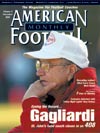AMERICAN FOOTBALL MONTHLY THE #1 RESOURCE FOR FOOTBALL COACHES
Article CategoriesAFM Magazine
|
Gary Gaines Trades Lights for Sunny Saturday AfternoonsQ&A with Abilene Christian University head coach Gary Gainesby: Aaron S. Lee © More from this issue GARY GAINES WILL BE THE FIRST ONE TO TELL YOU that nothing comes easy – especially in coaching. In fact, the Abilene Christian University head football coach wouldn’t have it any other way. Gaines, who led teams to nine playoff appearances in 17 years as a high school coach, gained national attention as the head coach of Odessa Permian after being featured in H.G. Bissenger’s best-selling book Friday Night Lights. Gaines went on to lead Odessa Permian to the 1989 Class 5A state championship in Texas and the mythical national championship. However, Bissenger’s book loomed larger tha....The full article can only be seen by subscribers. Subscribe today!
|
|
|||||||
| HOME |
MAGAZINE |
SUBSCRIBE | ONLINE COLUMNISTS | COACHING VIDEOS |
Copyright 2025, AmericanFootballMonthly.com
All Rights Reserved





